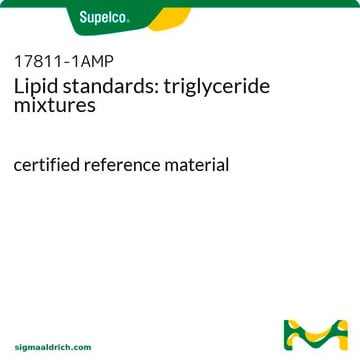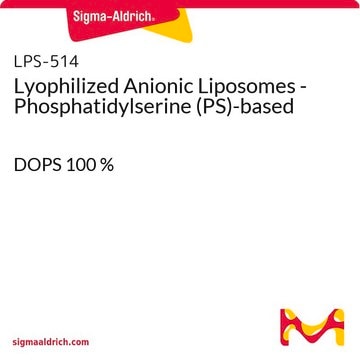LM1004
Avanti
17:0-14:1 PC
Avanti Research™ - A Croda Brand LM1004, methanol solution
Synonym(s):
1-heptadecanoyl-2-(9Z-tetradecenoyl)-sn-glycero-3-phosphocholine
About This Item
Recommended Products
form
methanol solution
packaging
pkg of 1 × 1 mL (LM1004-1EA)
manufacturer/tradename
Avanti Research™ - A Croda Brand LM1004
concentration
~10 μg/mL (Refer to C of A for lot specific concentration.)
application(s)
lipidomics
metabolomics
shipped in
dry ice
storage temp.
−20°C
SMILES string
[O-]P(OCC[N+](C)(C)C)(OC[C@]([H])(OC(CCCCCCC/C=C\CCCC)=O)COC(CCCCCCCCCCCCCCCC)=O)=O
InChI
1S/C39H76NO8P/c1-6-8-10-12-14-16-18-19-20-22-23-25-27-29-31-38(41)45-35-37(36-47-49(43,44)46-34-33-40(3,4)5)48-39(42)32-30-28-26-24-21-17-15-13-11-9-7-2/h13,15,37H,6-12,14,16-36H2,1-5H3/b15-13-/t37-/m1/s1
InChI key
PLMJQEBGYPYWCL-IEHWZJNJSA-N
Application
- for phospholipid dipalmitoylphosphatidylcholine (DPPC), quantification by selected reaction monitoring method
- for lipid analysis of murine brain lipid extract using Fourier transform-ion cyclotron resonance-mass spectrometry (FT-ICR-MS)
- in lipid extraction to control extraction efficiency, evaluate liquid chromatography (LC)-MS performance and normalize the LC-MS data
- for lipid quantification using LC-MS
Packaging
Legal Information
also commonly purchased with this product
Signal Word
Danger
Hazard Statements
Precautionary Statements
Hazard Classifications
Acute Tox. 3 Dermal - Acute Tox. 3 Inhalation - Acute Tox. 3 Oral - Flam. Liq. 2 - STOT SE 1
Target Organs
Eyes
Storage Class Code
3 - Flammable liquids
WGK
WGK 2
Flash Point(F)
49.5 °F - closed cup
Flash Point(C)
9.7 °C - closed cup
Choose from one of the most recent versions:
Certificates of Analysis (COA)
Sorry, we don't have COAs for this product available online at this time.
If you need assistance, please contact Customer Support.
Already Own This Product?
Find documentation for the products that you have recently purchased in the Document Library.
Our team of scientists has experience in all areas of research including Life Science, Material Science, Chemical Synthesis, Chromatography, Analytical and many others.
Contact Technical Service


![4-[4-(Dimethylamino)phenylazo]benzoic acid N-succinimidyl ester ≥98.0% (HPLC)](/deepweb/assets/sigmaaldrich/product/structures/120/235/500b5276-3ce2-43b7-9588-3883f13d4ff7/640/500b5276-3ce2-43b7-9588-3883f13d4ff7.png)





![γ-[(6-Azidohexyl)-imido]-ATP sodium salt](/deepweb/assets/sigmaaldrich/product/structures/219/775/fab7c78e-9638-4061-9426-e4c60dc1fb76/640/fab7c78e-9638-4061-9426-e4c60dc1fb76.png)


